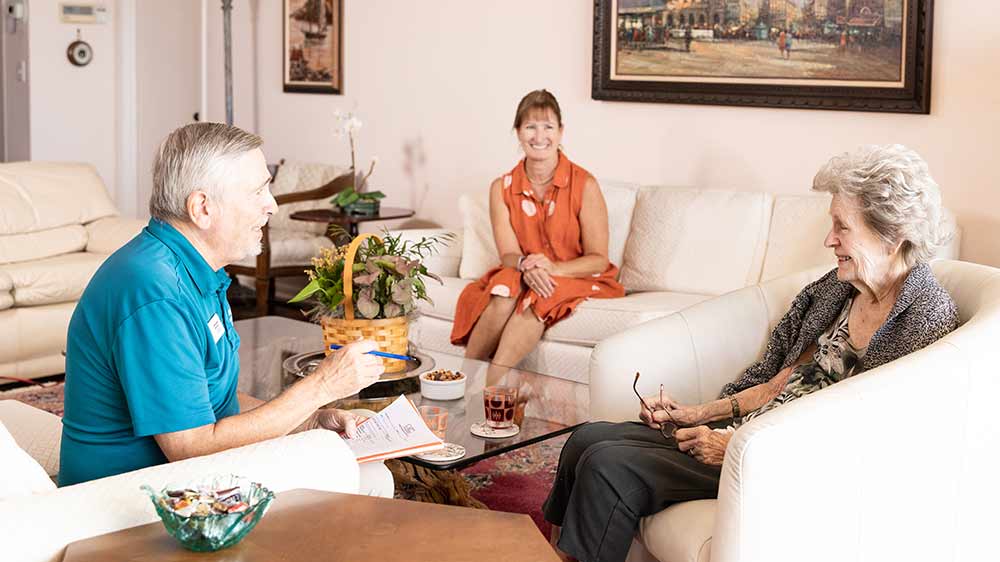

Family Caregiver Stress: Understanding, Preventing and Coping
We all experience stress from time to time, and for most of us, when the cause of our stress passes or is resolved, we move on. However, if you’re a family caregiver for an elderly loved one, stress can become chronic and lead to physical health and mental issues. April is National Stress Awareness Month, and in recognition, Right at Home offers information about stress and advice for managing it.
The Red Flags of Stress Burnout
With family caregiver stress comes physical and mental problems. The American Psychological Association states, “Stress affects all systems of the body including the musculoskeletal, respiratory, cardiovascular, endocrine, gastrointestinal, nervous, and reproductive systems.” And, people respond to stress in different ways, family caregivers included. There are many different signs and symptoms of caregiver stress, including:
- Anxiety, depression, irritability
- Feeling tired and run down
- Difficulty sleeping
- Overreacting to minor nuisances
- New or worsening health problems
- Trouble concentrating
- Feeling increasingly resentful
- Drinking, smoking, or eating more
- Neglecting responsibilities
For a family caregiver, burnout is real. It is defined as a state of physical, emotional and mental exhaustion. According to the Cleveland Clinic, it may be accompanied by a change in attitude, from positive and caring to negative and unconcerned. Some examples include:
- Having much less energy than you once had
- Feeling like you catch every cold or bout of flu that is going around
- Being constantly exhausted, even after sleeping or taking a break
- Neglecting your own needs
- Having little satisfaction because your life revolves around caregiving
- Having trouble relaxing, even when help is available
- Becoming increasingly impatient and irritable with the person you’re caring for
- Feeling helpless and hopeless
Family Caregiving Can Take a Financial Toll Also
Caring for an elderly loved one can take a financial toll as well. The National Institutes of Health estimates that family caregivers provide an average of 24 hours of care a week. This can have a negative effect—it can result in lost work hours, loss of a job, and failure to advance in a career. And often, family caregivers can be called upon to cover out-of-pocket expenses for food, medications, and household supplies.
Coping With Caregiver Stress
The first step in coping with caregiver stress is identifying it. A good place to start is to take a self-assessment. A myriad of assessments is available online. Health In Aging offers one example. The U.S. Department of Veterans Affairs also provides an assessment if you care for a veteran.
After assessing your stressors, take action to reduce your stress. Here are some tips:
- Ask for Help – Enlist your siblings or other family members for help in the form of providing a respite break. Whether it’s giving you a break on a regular basis, running errands, or providing transportation for your loved one to medical appointments, anything can help. If you don’t have relatives nearby, consider seeking respite care from a professional in-home care agency such as Right at Home.
- Take Care of Your Own Health – Getting enough sleep and eating a healthy, balanced diet is critical for your health. Set aside some time regularly to get exercise. Don’t put off preventive medical care appointments, and be sure to tell your doctor about your caregiving responsibilities. He or she may have helpful advice.
- Talk to Your Supervisor – If you are a working family caregiver, let your supervisor know about your caregiving responsibilities. Your employer likely offers an Employee Assistance Program (EAP) that can connect you with confidential counseling services and help identify resources.
- Develop a Communications Plan – Keeping your relatives and friends updated about your loved one can be time-consuming. Instead of communicating individually with each one via phone calls or emails, turn to the internet. Several websites offer free ways to correspond with loved ones and friends without one-on-one communication. Check out CaringBridge, PostHope, and MyLifeLine.
- Find Resources in Your Community – There are many resources offered by organizations such as the AARP, Alzheimer’s Association, and Family Caregiver Alliance.
- Set Your Priorities – Caregiving is a priority, but it likely isn’t your only one. We all are called on to take responsibility for helping loved ones, but you don’t have to do it all. If it’s your turn to bring the birthday snack to the office, stop by the bakery instead. If you’ve hosted holiday dinners for years, give someone else the honor. Assess your priorities and set the most important ones—you, your spouse, and your kids if they live at home.
How Right at Home Can Help
Right at Home offers a RightConversations Guide to help families with conversations they may need to have about the well-being of aging loved ones. Download a FREE copy today. And if you would like more information about our respite care services, use our office locator to find an office close to you.







